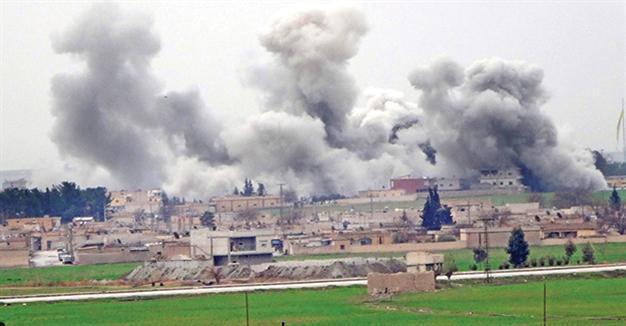Lavrov urges UN envoy to include Kurds in Syria talks
MOSCOW – Agence France-Presse

AFP Photo
Russian Foreign Minister Sergei Lavrov on March 11 urged the U.N.’s special envoy to Syria Staffan de Mistura to include Kurds in upcoming talks that aim to resolve the five-year Syrian civil war, while also lashing out at Turkey for blocking the Syrian Kurds from being involved in the talks.“I am convinced that Staffan de Mistura should take such a decision,” Lavrov told reporters at a joint news conference with his Chinese counterpart Wang Yi.
“Launching negotiations without the participation of this group would be a sign of weakness from the international community,” Lavrov said.
Russia’s top diplomat argued that holding talks on forming a new ruling structure in Syria to prepare constitutional reform and elections without Kurds would be “a most serious infringement of the rights of a large and significant group living in Syria.”
Kurds are “allies both of the U.S. coalition and Russia” and control at least 15 percent of Syrian territory,” Lavrov added.
Lavrov hit out at Turkey, saying that “only Turks are blocking the invitation of Kurds from the Syrian Kurdish Democratic Union Party (PYD),” criticizing this as “an ultimatum.”
Turkey accuses the PYD and its military wing, the People’s Protection Unit (YPG), of being the Syrian branch of the outlawed Kurdistan Workers’ Party (PKK), with which it has been in armed clashes since mid-1980s.
The issue of the PYD and YPG caused a rare rift between Ankara and Washington.
The United States regards the YPG as the most effective fighting force on the ground against the Islamic State of Iraq and the Levant (ISIL) and has resisted Turkish pressure to classify the group as a terror organization.
De Mistura told Russian state news agency RIA Novosti March 11 that “we are not sending out new invitations” to the upcoming talks, in response to a question on broadening opposition participation.
At the same time, in comments translated into Russian, he stressed the importance of “ensuring as far as possible inclusiveness and participation of all Syrians who can make a contribution to Syria’s future.”
The U.N. is hoping to restart on March 14 peace talks that collapsed last month, building on a ceasefire that has led to the first significant decline in violence in Syria’s nearly five-year civil war.
Syria’s main opposition body, the High Negotiations Committee, said March 11 that it would attend indirect peace talks with the government in Geneva.
In a statement distributed to reporters, the HNC said it would participate in the negotiations as part of its “commitment to international efforts to stop the bloodshed and find a political solution.”
Mistura also said that elections in Syria observed by the U.N. should be held in 18 months.
“New elections... should be held 18 months from the start of talks, that is from March 14,” de Mistura said.
“The elections, both presidential and parliamentary, will be under U.N. observation,” he said in comments translated into Russian.
















